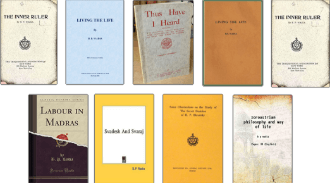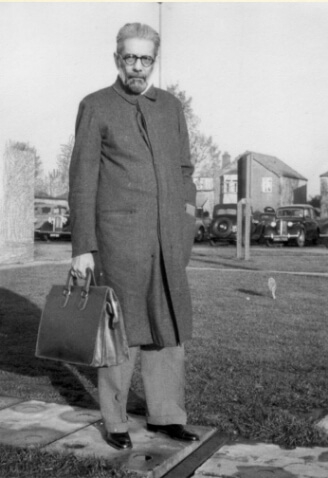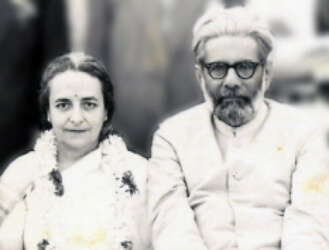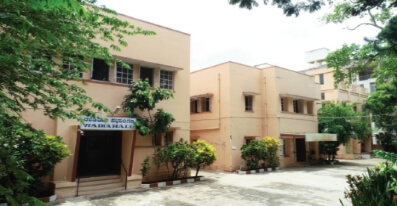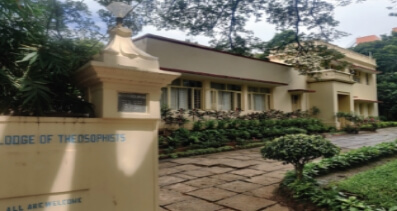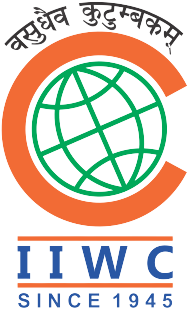Early Life Bahmanji Pestonji Wadia (BPW for short) was born in Bombay on 8 October 1881. He was the eldest son of Pestonji Cursetji Wadia and Mithabai. BPW, after completing the matriculation examination in Bombay, did not enter college. His father made him join a large British textile firm in 1900. The arrangement proved short-lived, as BPW absolutely refused to utter any untruth in the course of business. He thereafter joined his father’s firm, engaged in the sale of textiles. Within four weeks of BPW joining the firm, his father passed away all of a sudden. BPW was obliged to assume responsibility for the maintenance of his widowed mother and his siblings. With the help of an experienced family friend, BPW quickly learned to manage his business and prospered at it. |
|
| Influence of Theosophy BPW had earlier been introduced to the writings of Madame H.P. Blavatsky through a close family friend, J.D. Mahaluxmiwala. It did not take long for him to make a firm resolve to devote his whole life to sharing Theosophy with others. With that end in view, BPW sold his prospering business in 1904 and wisely invested the capital so acquired to take care of his mother, brother and sisters. BPW thereafter offered his services to Col. Olcott, Founder-President of the Theosophical Society, and after Col. Olcott’s death, to Mrs. Annie Besant, who succeeded Col. Olcott as President of the Theosophical Society. |
Journey from building warships to trade union pioneer In the course of his political work, BPW became acquainted with the plight of the textile workers in the local Madras mills. BPW was responsible for starting the first Labour Union in the country, viz.. The Madras Textile Workers’ Union. The building housing the Union is even today known as “Wadia House” and the park facing it is called “Wadia Park.” As a labour leader of unquestioned integrity, BPW was invited to give testimony before a Parliamentary Committee in England. He was also appointed by the Government of India as a delegate to attend the first International Labour Conference under the League of Nations in Washington D.C., in 1919; he was, in fact the Technical Adviser to the Indian Delegation. This gave him a welcome opportunity to visit many branches of the Theosophical Society in Europe, England, the United States and Canada. |
| Prolific Writer He left Bombay for Madras (Adyar) in 1908, where he was appointed Manager of the Theosophical Publishing House. He also became the Assistant Editor of The Theosophist under Mrs. Annie Besant. BPW’s association with the Theosophical Society was active and lasted till 1922. It was in Adyar in 1918 that BPW had a vision of Madame H.P. Blavatsky (H.P.B.) which convinced him of the power of Theosophy as a living philosophy of daily life. B.P. Wadia was a prolific writer who with his unique knack of putting into words the various philosophical thoughts and mundane aspects of life. He authored more than 30 books which saw multiple prints and also was the assistant editor of ‘The Theosophist’ at Adyar and later as co-editor of, ‘The Theosophical Movement’ which started on 17th November 1930. He also contributed immensely to the various contents in the 30 book series of ‘The Aryan Path’. |
Joins the Freedom Movement Soon after his arrival in Madras, BPW joined the Home Rule Movement. He became wellknown in political circles. He knew personally all the great literary and political figures of his day, including Dr. S. Radhakrishnan, Mrs. Sarojini Naidu, Dr. Bhagwan Das and Pt. Bhavani Shankar. Valuing his enormous integrity, many used to urge him in his later years, especially after Gandhiji’s assassination, to re-enter active politics. BPW gently, but firmly refused, saying that he was working on something far wider and deeper in ambit. BPW’s early activities of a political nature led to his internment in Ootacamund. It was a kind of house arrest which lasted from 16 June to 7 September 1917. This incidentally gave BPW an opportunity to know more about the mysterious Toda Tribe. |
|
| Theosophy and Cultural Promotion with full dedication While on a visit to the Krotona Lodge of the Theosophical Society in Hollywood in 1919, he established contact with the United Lodge of Theosophists (U.L.T.) for the first time. He was thrilled to read the U.L.T. Declaration. He was earlier spearheading a “Back to Blavatsky” effort within the Theosophical Society as he used to feel that the organisation was drifting away from the original lines laid down by H.P.B., and that it had not been fair to H.P.B’s closest friend and co-worker, W.Q. Judge. He found in the U.L.T. an ideal forum for exemplifying the original programme. As he failed in his efforts to secure adjustment of the programme within the Theosophical Society, he resigned from the Theosophical Society on 18 July 1922, with a printed resignation and statement; and worked thereafter as an Associate of the U.L.T. During the period 1923-28, BPW was a dynamic force strengthening the U.L.T. in various places in the U.S.A., especially in Los Angeles and New York. Towards the end of 1928, BPW resolved to bring the U.L.T. work and method to India. Miss Sophia Camacho, (of Columbian Origin ) who became acquainted with BPW in New York, decided also to proceed to India to assist BPW in this effort. A “marriage of convenience” between the two took place in London in 1928. Certain other dedicated students such as Mr. and Mrs. Wm. D. TenBroeck of Los Angeles, Mr. and Mrs. T.L. Crombie of London, Mr. and Mrs. Donald Townsend and Miss Eleanor Hough, also came to India to work for Theosophy. The Bombay branch of the U.L.T. was declared open on 17 November 1929. On 17 November 1930 the first number of The Theosophical Movement (monthly magazine) was issued. Other branches of the U.L.T. came to be established in Matunga (Bombay), Bangalore, New Delhi and Madras. BPW’s indefatigable efforts to strengthen the U.L.T. in different parts of the world can scarcely be over-estimated. |




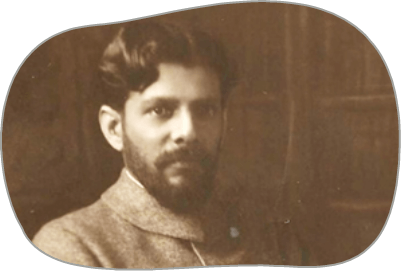
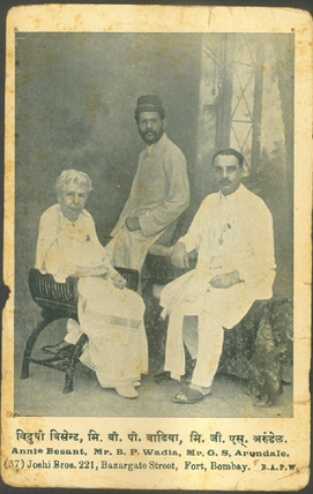
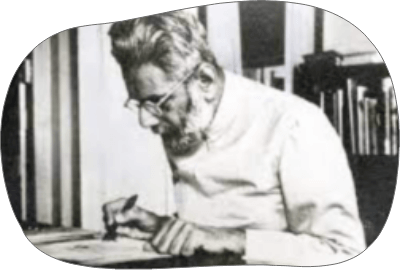 Founder
Founder
